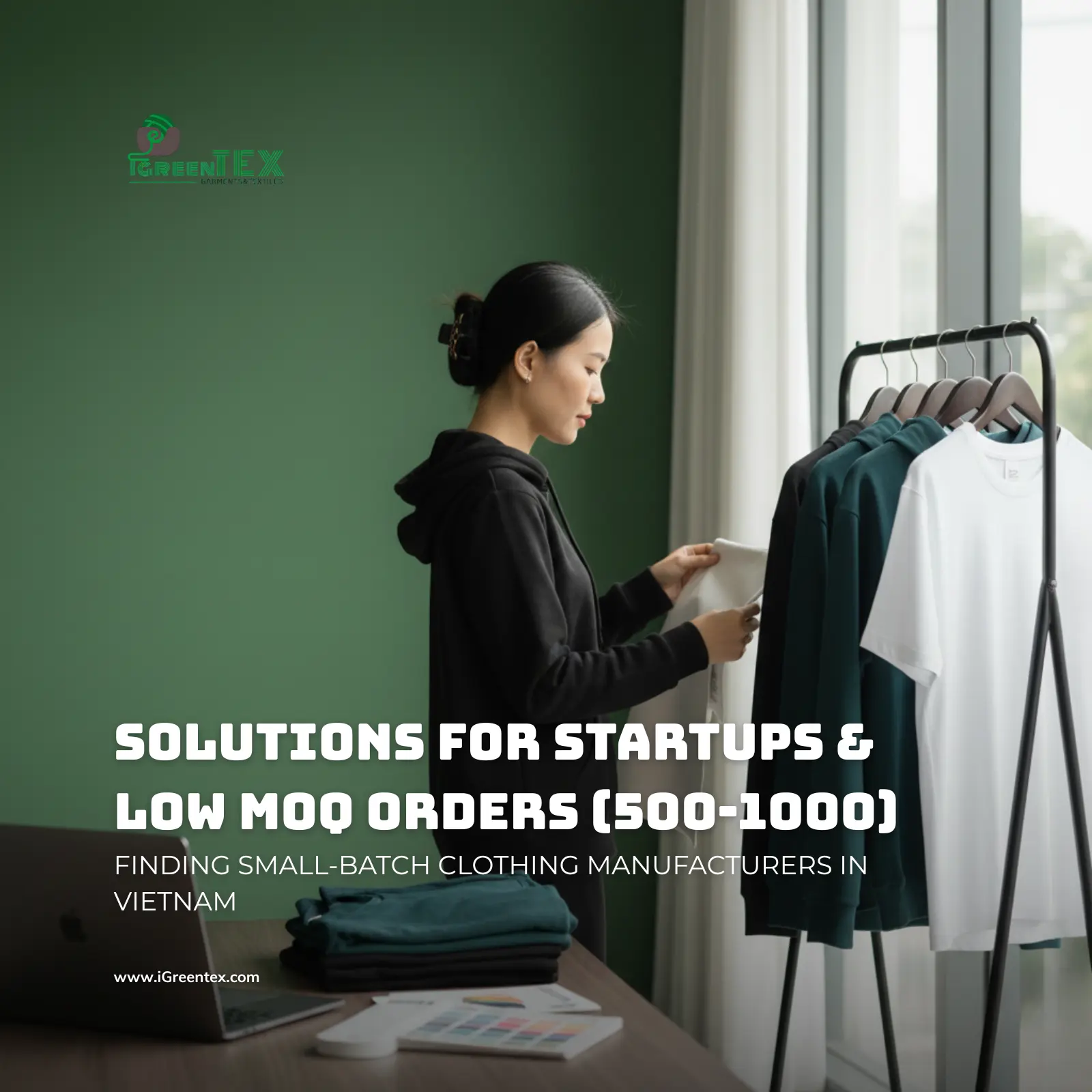- The Ultimate Guide to Avoiding Clothing Manufacturer Scams in Vietnam (An Insider’s Warning)
- 1. “The $50,000 Silence”: A Founder’s True Story
- 2. The Scale of the Threat: What the Data Suggests
- 3. You’re Not a Tourist. You’re a Business. The Critical Difference Between Fakes & Fraud
- 4. The Anatomy of a Scam: 3 Fraud Archetypes to Watch For in Vietnam
- 5. Your Proactive Defense Plan: The Insider’s 7-Point Verification Checklist
- 6. The Language of Trust: Communication Red Flags
- 7. Building Your Fortress: “Scam-Proof” Contract Clauses
- 8. The Real Solution: You Don’t Need a Supplier, You Need a Shield
- 9. The First Step to Secure Production: Your Free Risk Assessment
- About iGreen Tex Vietnam
- IGREEN TEX VIETNAM CO LTD
The Ultimate Guide to Avoiding Clothing Manufacturer Scams in Vietnam (An Insider’s Warning)
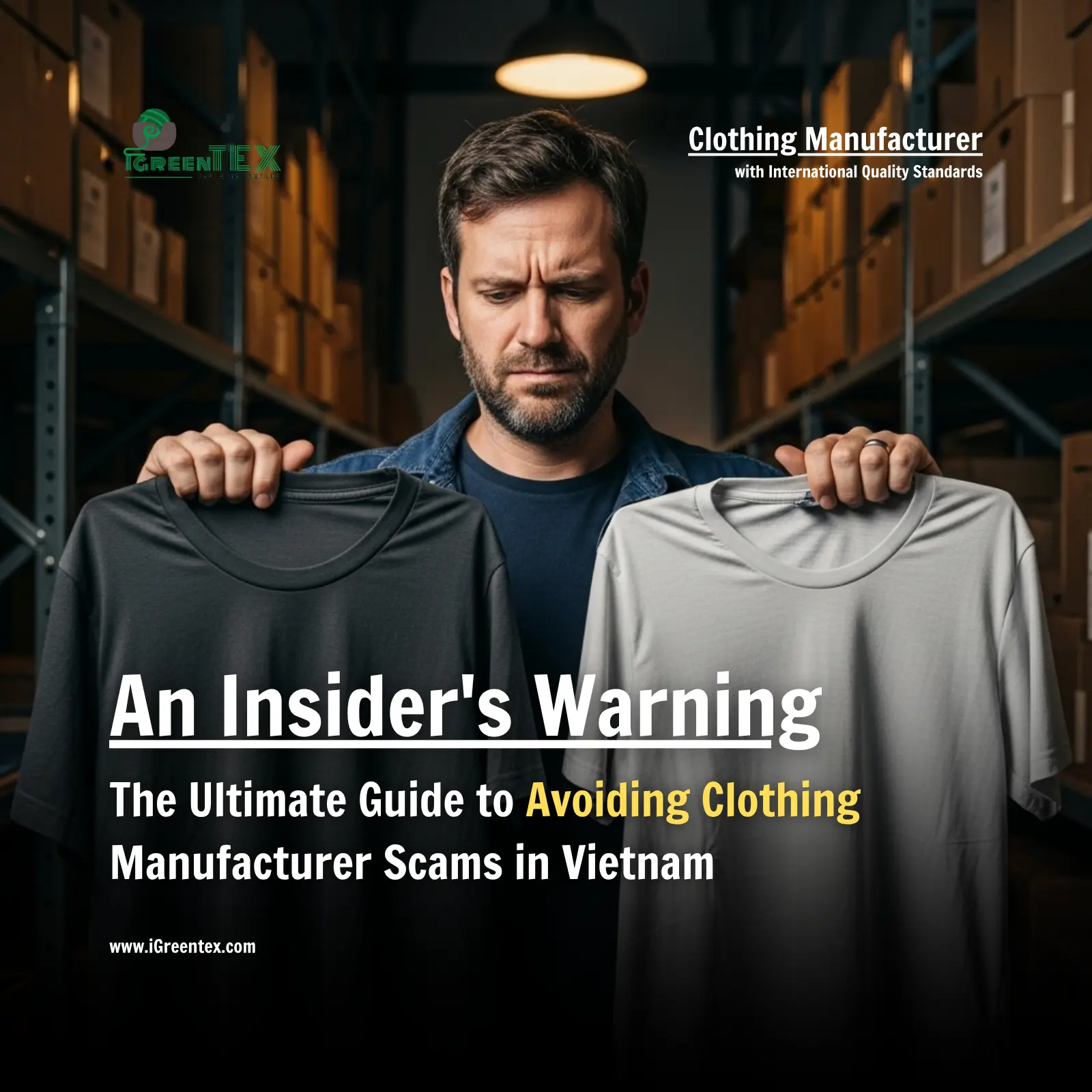
Vietnam’s apparel industry offers an incredible opportunity for global fashion brands. The combination of skilled labor and quality production is very attractive. But beneath this potential lies a significant risk. Sophisticated scams can lead to financial disaster and shatter a founder’s dream. This guide is not just a list of tips. It is a comprehensive defense plan. We provide a step-by-step framework for avoiding clothing manufacturer scams in Vietnam. It is designed to protect your investment, your timeline, and your brand’s reputation. To understand what’s truly at stake, let’s begin with a story that is all too common.
1. “The $50,000 Silence”: A Founder’s True Story
Alex, a former graphic designer from Austin, Texas, poured his life savings into his brand. His dream was a sustainable streetwear line. For a year, he spent late nights perfecting every detail. He had the designs, the brand story, and a perfect vision. The final step was finding a production partner in Vietnam. A critical part of his plan was avoiding clothing manufacturer scams in Vietnam.
After weeks of searching, he found a factory. Their website was professional and convincing. Their communication was fast, friendly, and detailed. They sent him photos and videos from a busy factory floor. He felt a huge sense of relief. He believed he had succeeded.
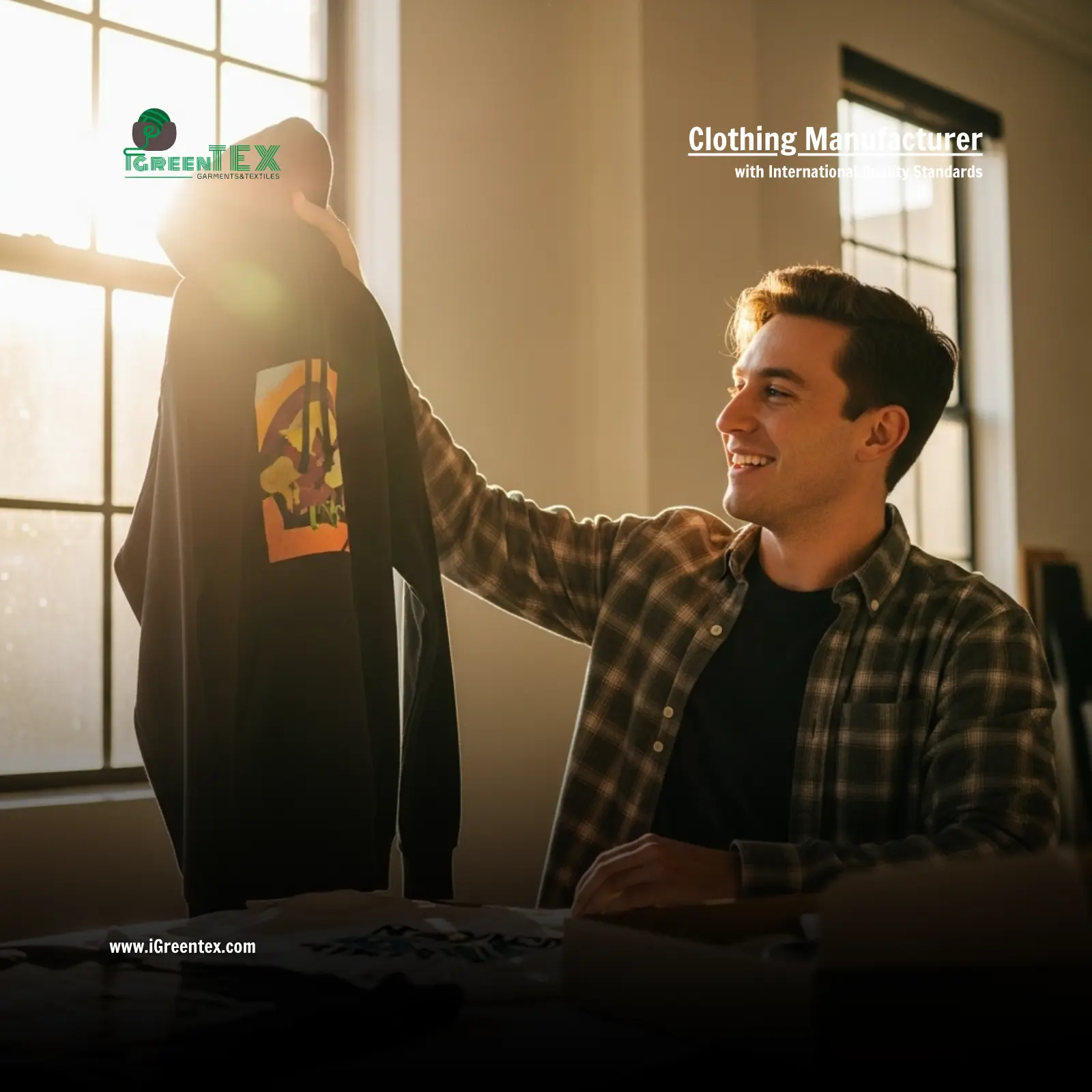
The samples that arrived were flawless. The recycled cotton had the perfect weight and feel. The stitching on the hoodies was impeccable. The screen printing was sharp and vibrant. This was it. Alex had found his partner. The challenge of avoiding clothing manufacturer scams in Vietnam seemed to be over for him.
When the proforma invoice for the 50% deposit arrived, he paid it. A proforma invoice is a preliminary bill of sale. It is sent to buyers in advance of a shipment of goods. The amount was $50,000. He paid it without any hesitation. He felt the hardest part was finally done.
Then came the silence.
First for a day. Then three days. The friendly WhatsApp number was suddenly “no longer in service.” His emails started to bounce back. The professional website vanished completely from the internet. A sick, dropping feeling grew in his stomach. He finally realized the devastating truth. The factory, the samples, the videos, the friendly contact… none of it was real. It was all a sophisticated trap. The goal was his $50,000 deposit. Alex’s dream was in jeopardy.
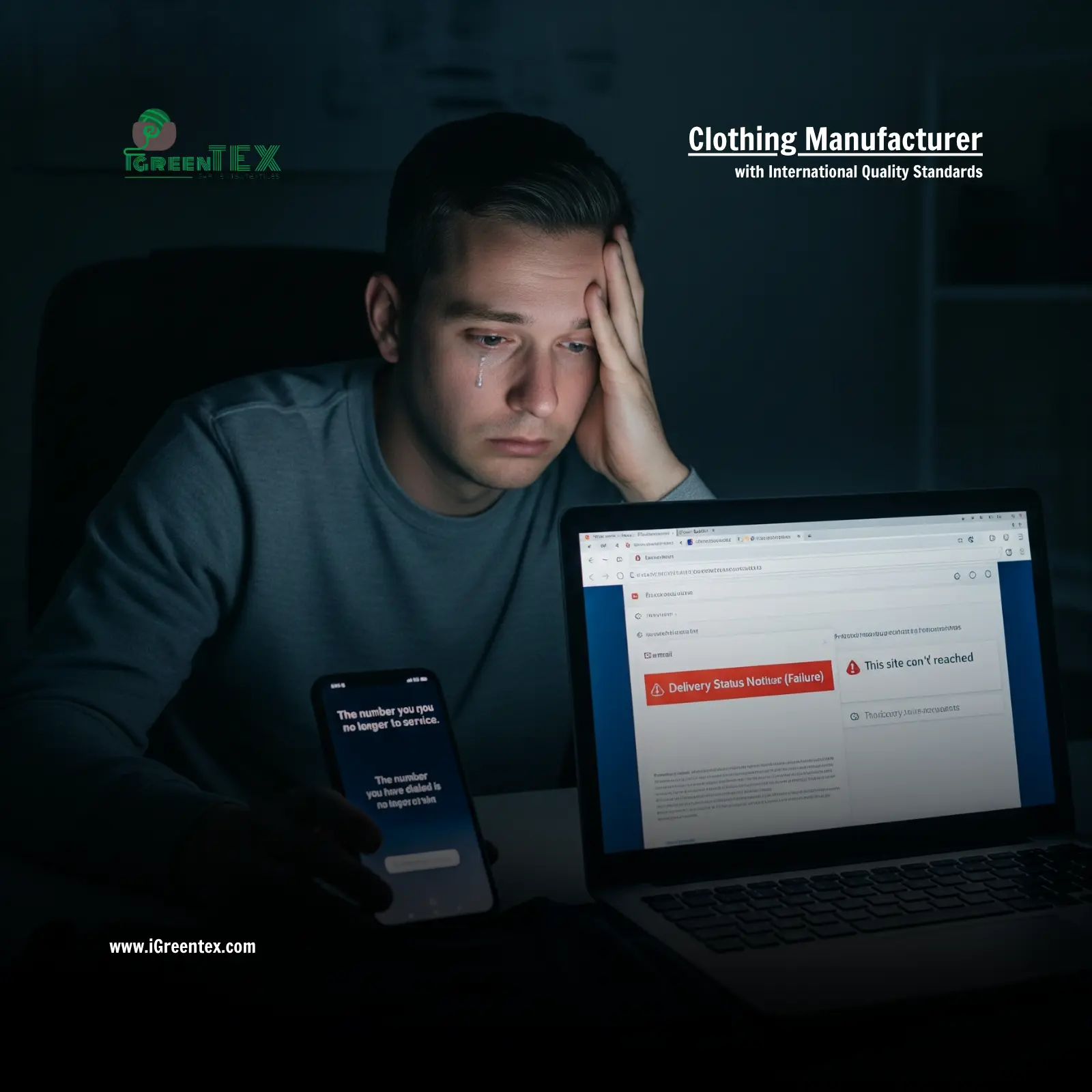
Alex’s story is a painful but necessary warning. It highlights the real risks that brands face every day. This guide is your detailed plan for avoiding clothing manufacturer scams in Vietnam. It’s built to protect your dream. It will help you learn how to avoid fraudulent clothing suppliers in Vietnam. Let’s ensure this story never becomes your story.
2. The Scale of the Threat: What the Data Suggests
It is crucial to understand the scale of this problem. Official, publicly audited statistics on manufacturing fraud are rare. This is because many cases go unreported. However, industry data and global trends paint a clear picture of the risk. Acknowledging this is the first step in preventing apparel production fraud in Vietnam.
Some internal industry reports suggest a significant number of businesses are affected. They indicate that up to 17% of small brands may face serious issues. These problems can include major fraud when sourcing manufacturers in Asia. While this number is not from a public VITAS report, it reflects the concerns shared within the industry. The threat is real and significant.

The financial damage from these scams can be devastating. International studies agree that a single incident can cause huge losses. Losses can easily wipe out a brand’s entire production budget. The risk is not just a few thousand dollars. It is often a business-ending amount of money. This reinforces the need for a solid plan for how to avoid fraudulent clothing suppliers in Vietnam.
This is also a growing global problem. Official reports from bodies like Interpol confirm a sharp rise in B2B scams. They especially note this trend in Asian supply chains after the pandemic. While Interpol does not give a specific percentage increase like 34%, the trend is clear and upward. The risk of encountering fraud is increasing. Your strategy for avoiding clothing manufacturer scams in Vietnam must be more robust than ever.
3. You’re Not a Tourist. You’re a Business. The Critical Difference Between Fakes & Fraud
Your first step is to change your mindset. You must stop reading advice written for tourists. Most search results talk about “fake goods” or “counterfeits.” Your problem is much more serious. You are facing sophisticated B2B “manufacturing fraud.” Understanding this difference is key to preventing apparel production fraud in Vietnam. It forms the foundation of a successful sourcing strategy.
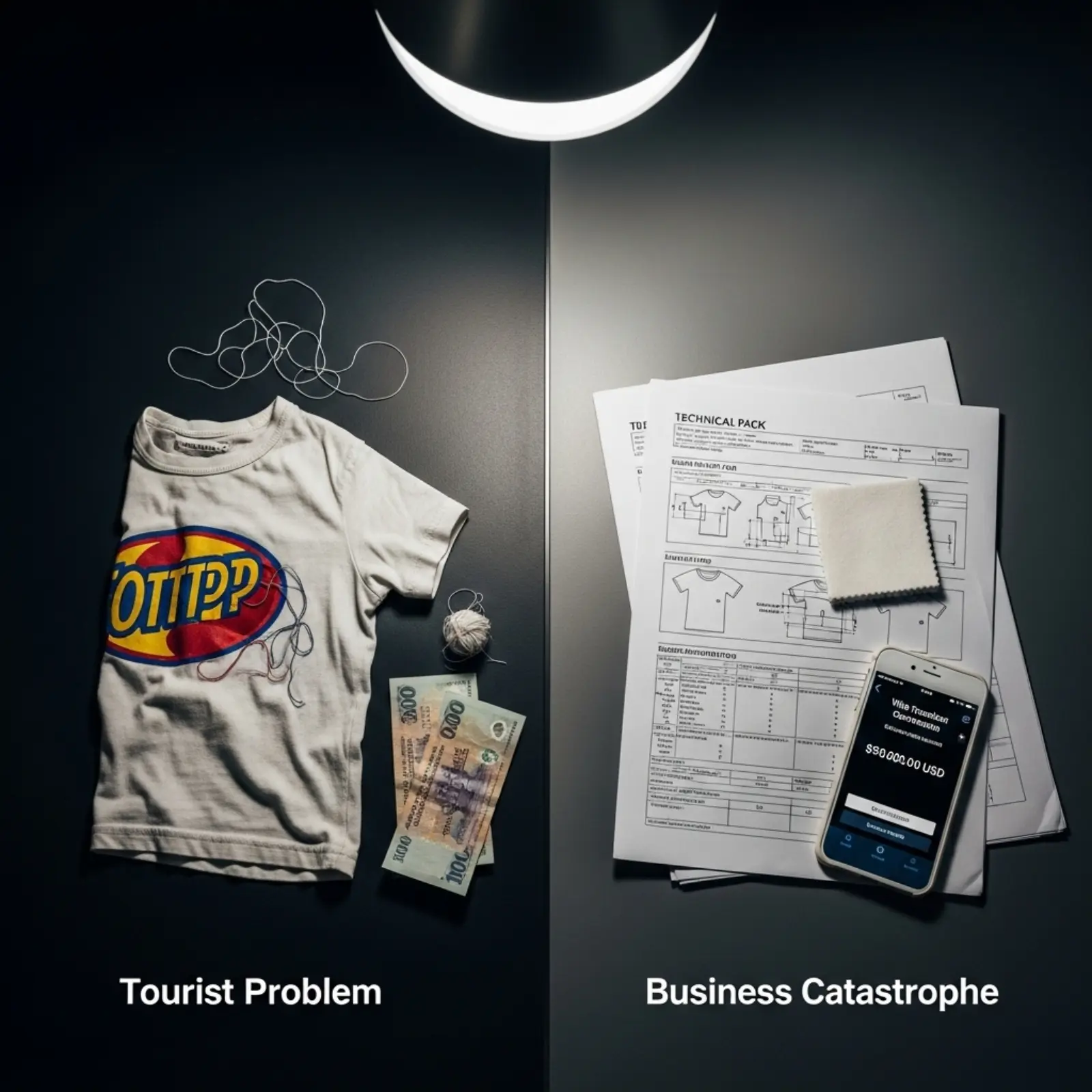
Let’s look at the critical differences in detail.
Tourist Problem: Fake Goods
- Risk: Losing $50 on a low-quality t-shirt at a market.
- Consequence: Feeling annoyed for a day. A funny story to tell later.
- Scammer: A street vendor or a local market stall owner.
- Advice: “Check the logo stitching.” or “Haggle on the price.”
Business Catastrophe: Manufacturing Fraud
- Risk: Losing $50,000 (or more) in deposits. Losing your entire production budget.
- Consequence: Bankruptcy. Missing your critical launch date. Destroying your brand’s reputation before it even starts.
- Scammer: A professional, organized online criminal enterprise. They are experts in digital deception.
- Advice: Requires a deep, multi-step verification process and legal protection.
Advice for avoiding a fake designer bag will not protect your business. You need a completely different set of rules. A proactive strategy for avoiding clothing manufacturer scams in Vietnam is not optional. It is absolutely essential for your survival. Our guide focuses on these professional-level threats. We provide actionable intelligence. This is your playbook for how to avoid fraudulent clothing suppliers in Vietnam.
4. The Anatomy of a Scam: 3 Fraud Archetypes to Watch For in Vietnam
Experience shows that scams follow predictable patterns. Knowing these patterns is your first line of defense. It is a fundamental part of avoiding clothing manufacturer scams in Vietnam. While data on the exact percentage of each scam type is from internal sources, these three methods are widely recognized as the most common threats in the industry. A deep understanding of these methods is critical for preventing apparel production fraud in Vietnam.
The Ghost Factory

This is the exact scam that trapped Alex. It is the most direct and devastating type of fraud.
How it works: These scammers are masters of digital deception. They build professional websites using stolen photos from real factories. They may create a virtual office address in a major city. Their entire operation is online. It is designed to look real and trustworthy. They communicate professionally and may even send perfect samples. These samples are often made by a different, high-quality factory that they paid. Their only goal is to receive your first large deposit. After the money is transferred, they disappear completely. The entire operation vanishes. This is a painful lesson in preventing apparel production fraud in Vietnam.
The Bait-and-Switch
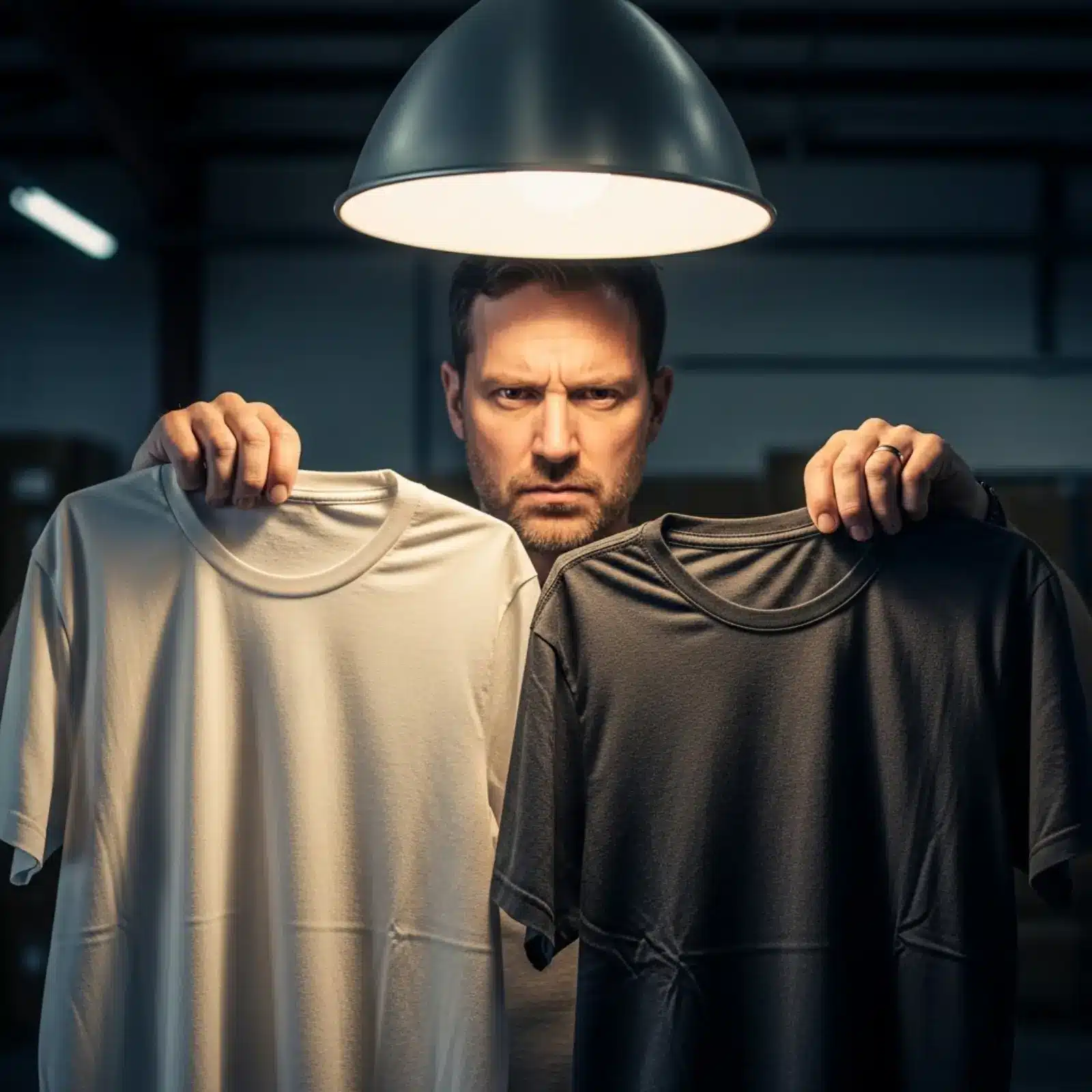
This type of fraud is more subtle and complex. The scammer runs a real, but very low-quality, factory.
How it works: They have a small, clean showroom or sample room. They may even outsource your samples to a top-tier factory. This is the “bait.” The samples you receive are excellent. They win your trust and your business. You confidently pay the deposit for bulk production. This is where the “switch” happens. Your full order is produced in their own cheap, low-quality facility. They use inferior materials and unskilled labor. This maximizes their profit margin. You will not know this has happened until 10,000 flawed units arrive at your warehouse. At that point, it is too late. Vigilance is needed for avoiding clothing manufacturer scams in Vietnam.
The Quality Fade
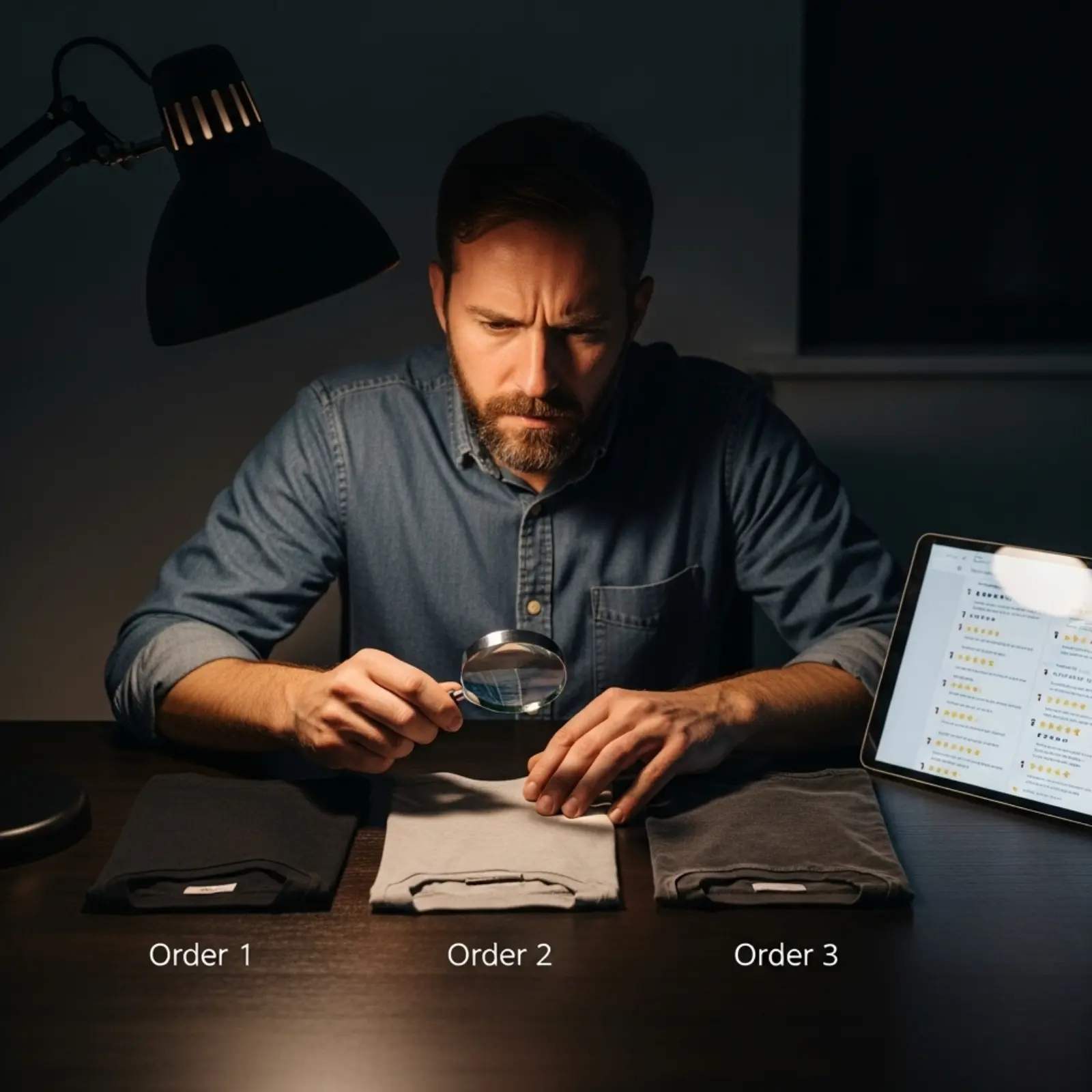
This is a long-term scam. It is designed to exploit the trust that is built over time. It is a slow and insidious form of fraud.
How it works: The first order you place is perfect. The quality is great, and delivery is on time. This builds your confidence in the supplier. On the second order, they switch to a slightly cheaper thread. On the third order, they use a lower-grade fabric. Each change is very small. It is almost impossible to spot from thousands of miles away. Over time, the quality of your product slowly degrades. You only find out when your customers start complaining. They post reviews about products falling apart after just a few washes. This damages your brand’s reputation slowly but surely. A core part of how to avoid fraudulent clothing suppliers in Vietnam is consistent verification, not just one-time checks.
5. Your Proactive Defense Plan: The Insider’s 7-Point Verification Checklist
General advice like “check their documents” is useless and dangerous. You need a practical, actionable checklist. This section provides exactly that. It is the heart of our guide on avoiding clothing manufacturer scams in Vietnam. This checklist is your shield. It contains real-world tests that scammers cannot easily pass. Mastering this process is central to preventing apparel production fraud in Vietnam.
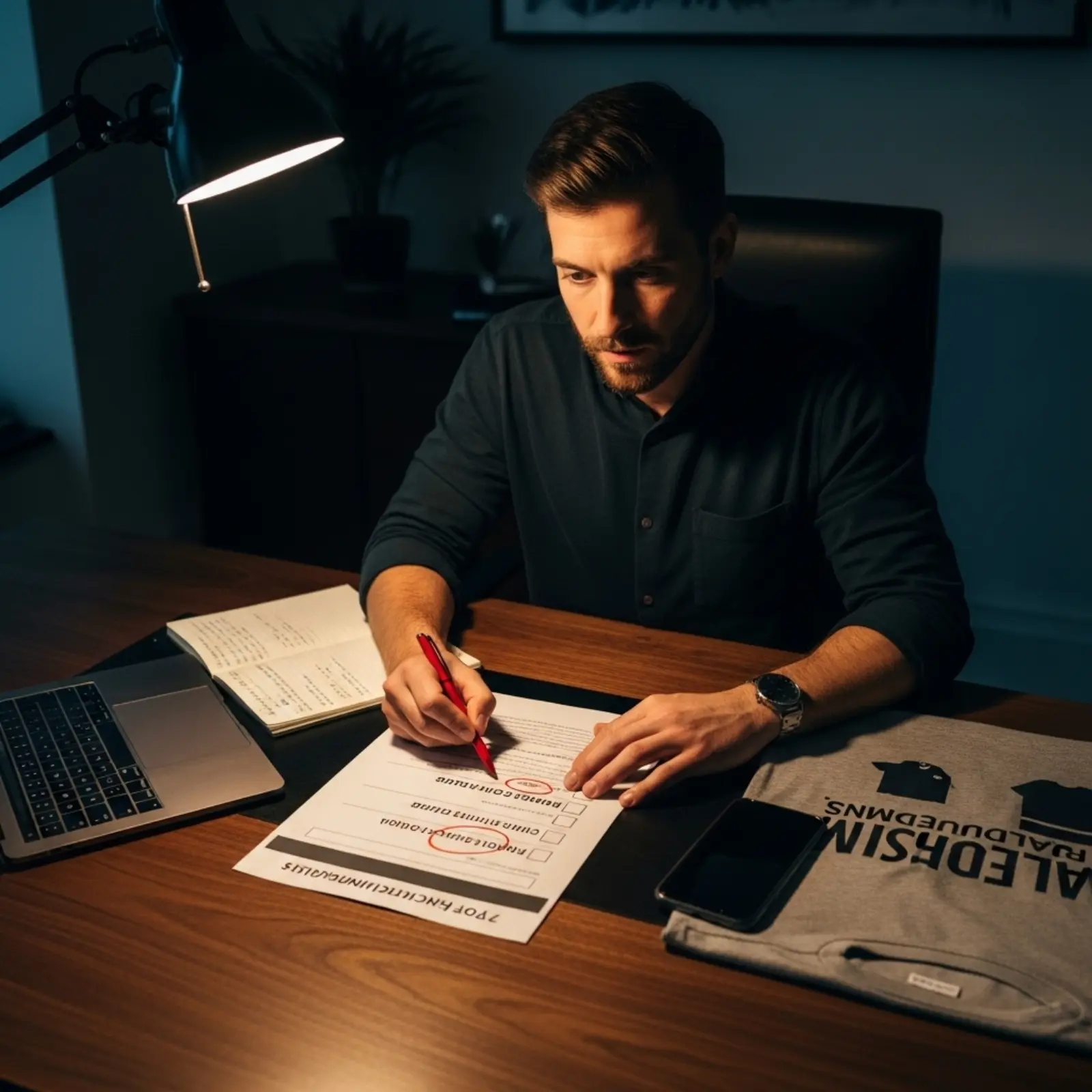
This is how to verify garment suppliers in Vietnam. Follow these steps diligently.
1. Go Beyond the Business License
Every legitimate business in Vietnam has a license. Scammers often have sophisticated fake ones.
Action: Don’t just ask for a scanned copy. Ask for a clear, high-resolution photo of the original document. Look for the official red stamp. Find the official “Mã số thuế” (Tax Code). This is a unique number for every registered business. You can use this code on Vietnam’s national business registration portal. A trusted local partner can help you do this easily. Verify their status is “Đang hoạt động,” which means “Active.” This simple check is a powerful tool for avoiding clothing manufacturer scams in Vietnam.
2. The “Utility Bill” Test
This is a simple but brilliant test. A Ghost Factory cannot pass it. This test creates a physical link to a real location.
Action: Ask for a copy of the factory’s electricity or water bill. Request the bill from the last three months. The address on that utility bill MUST match the address on the business license. It must be an exact, character-for-character match. No real factory can operate without utilities. A Ghost Factory operating from a laptop cannot produce this document. This is a critical step in how to avoid fraudulent clothing suppliers in Vietnam.
3. The Un-falsifiable Virtual Tour
Pre-recorded factory videos are often stolen and mean absolutely nothing. You need a live, unscripted video call to verify reality.
Action: During the live video call, make specific, sudden requests. For example: “Please write my name and today’s date on a piece of paper. Now, please place that paper on the main cutting table.” Another great request is: “Can you please introduce me to the person in charge of quality control right now?” A real factory manager can do this easily. A scammer will make excuses about bad internet or unavailable staff. Their reaction tells you everything. This proactive check is essential for preventing apparel production fraud in Vietnam.
4. Bank Account Verification
The flow of money is the most critical part to secure. Scammers often use personal bank accounts to avoid traceability.
Action: The beneficiary name on the invoice MUST be the exact, registered company name. It cannot be a personal name. A payment to an individual like “Nguyen Van A” instead of “ABC Garment Manufacturing JSC” is the single biggest red flag. A legitimate company will always use its registered corporate bank account. Never send large sums of money to a personal account. This rule is non-negotiable for avoiding clothing manufacturer scams in Vietnam.
5. Check Their Digital Footprint and History
Scammers create new websites constantly to stay ahead of bad reviews. Legitimate businesses have a history.
Action: Use online tools to check the age of their website domain. A website created only three months ago is a major warning sign. Look for the company on professional platforms like LinkedIn. See if they have employee profiles with real work histories. Look for reviews or mentions on industry forums. A complete lack of history is suspicious. Building a clear picture of their history is part of how to avoid fraudulent clothing suppliers in Vietnam.
6. Ask for Technical and Social Compliance Certifications
This step helps filter for professional and ethical operators. It’s a key attribute of trusted clothing factories Vietnam with certifications.
Action: Ask if they have certifications like ISO 9001 or WRAP. ISO 9001 is for quality management systems. WRAP is a popular certification for social compliance. While these are good signs, you must verify them independently. Ask for the certificate number and the name of the issuing body. Then, contact the issuing body directly to confirm the certificate is valid and active. Scammers can easily fake the certificate document itself. Verification is the most important part. This diligence is required for preventing apparel production fraud in Vietnam.
7. Start with a Small, Paid Trial Order
Never commit to a massive order based on samples alone. A trial run tests their real production capabilities.
Action: Before placing a 10,000-unit order, propose a small production run. Offer to pay for, perhaps, 100 or 200 units. A scammer wants a large, single deposit. They will often refuse a small order because the profit is not worth their effort. A legitimate factory looking for a long-term partner will often welcome this. They see it as a chance to prove their capabilities. This approach is a smart safety measure in your strategy for avoiding clothing manufacturer scams in Vietnam.
6. The Language of Trust: Communication Red Flags
How a potential supplier communicates tells you a lot about their business. Scammers often use predictable language and tactics. Recognizing these patterns is a key skill. This is one of the most important red flags when sourcing apparel manufacturers. Pay close attention to these signs. Being aware of them is vital for avoiding clothing manufacturer scams in Vietnam.
| Red Flag (Warning Sign) | Green Flag (Good Sign) |
| They are overly eager and pressure you for a quick deposit. They create false urgency. | They are patient and focus on understanding your project’s technical needs first. |
| They answer complex technical questions with vague promises like, “Don’t worry, we are very professional.” | They answer with specific details: “For that fabric, moisture control is a risk. Here is our 3-step process to manage it.” |
| They refuse to have a live video call, offering excuses about bad internet or company policy. | They welcome a live video tour and are transparent about showing you their operations. |
| The price they quote is significantly lower than all other quotes you have received. If it seems too good to be true, it is. | Their pricing is competitive but realistic. They can explain their costs clearly and justify their value. |
| They cannot provide any references from past clients, citing “confidentiality” for all of them. | They can provide references from clients in non-competing industries or show case studies. |
| They communicate only through generic email addresses and mobile apps. No landline or official address is provided. | They have official company email addresses, a landline phone number, and a verifiable physical address. |
Trust your instincts. If communication feels off, evasive, or overly aggressive, it probably is. This intuitive check is a part of any good plan for how to avoid fraudulent clothing suppliers in Vietnam.
7. Building Your Fortress: “Scam-Proof” Contract Clauses
A strong contract is your legal fortress. It clearly outlines expectations and protects you when things go wrong. Never rely on verbal agreements or simple email exchanges for large orders. This section covers how to sign safe contracts with Vietnamese suppliers. These clauses are essential for preventing apparel production fraud in Vietnam.
The AQL (Acceptable Quality Limit) Clause
This is the most critical quality clause in your contract. It turns the subjective idea of “good quality” into a measurable, mathematical standard.
What it is: An AQL clause defines the maximum number of defective units allowed in a batch. For example, AQL 2.5 means if an inspector finds more than 2.5% of products with major defects, you have the right to reject the entire shipment at the supplier’s cost. This protects you from the “Bait-and-Switch” scam. It requires a professional inspection. This is where professional quality inspection services for Vietnam apparel become invaluable.
Detailed Material and Production Specifications
Your contract must be extremely specific about what you are buying. Ambiguity is your enemy.
What it is: This clause lists every single detail of your product. It includes fabric type (e.g., “100% GOTS Certified Organic Cotton, 180 GSM”), thread brand, zipper model, color Pantone codes, and stitching density (stitches per inch). Without this, a supplier can legally use cheaper materials to cut costs. This is your main defense against the “Quality Fade” scam. Strong contracts are central to avoiding clothing manufacturer scams in Vietnam.
Clear IP (Intellectual Property) Ownership Clause
You must protect your designs. Your brand’s creativity is your most valuable asset.
What it is: A simple but powerful clause. It should state clearly: “All designs, patterns, and technical specifications provided by [Your Brand] remain the sole intellectual property of [Your Brand].” This prevents the factory from legally selling your unique designs to other brands or on the open market. This is a non-negotiable part of how to avoid fraudulent clothing suppliers in Vietnam.
Third-Party Inspection Rights
You need the undisputed right to inspect your goods before they ship. This right must be in writing.
What it is: Your contract must state that you (or a third-party inspection service you hire) have the right to access the factory. This access is for inspecting the goods before the final payment is made. A factory that resists this clause is a major red flag. They likely have something to hide. Transparency is a cornerstone of preventing apparel production fraud in Vietnam. A refusal should be a deal-breaker.
8. The Real Solution: You Don’t Need a Supplier, You Need a Shield
After reading this, do you feel more secure or more overwhelmed?
If this checklist and these legal considerations feel like a full-time job, that’s because they are. It’s our full-time job. The strategy of avoiding clothing manufacturer scams in Vietnam requires constant vigilance. It requires local knowledge, language skills, and deep technical expertise. It is much more than a simple checklist you can complete from afar.
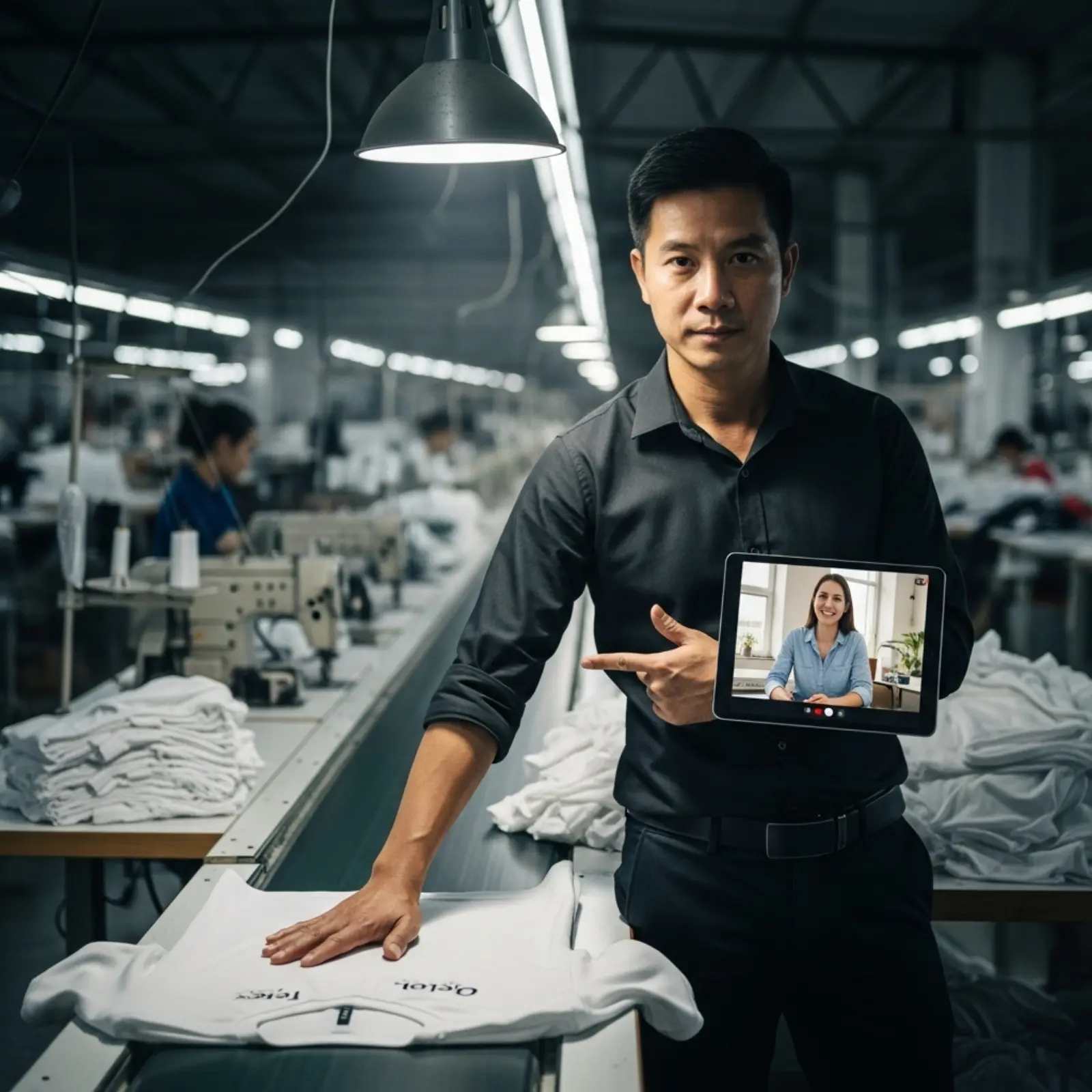
Smart brands are changing their strategy. They don’t just look for suppliers anymore. They look for a local production partner who acts as their shield. This is the new, safer model for global sourcing. It is the most effective method for preventing apparel production fraud in Vietnam.
At iGreen Tex, we are your operational team on the ground in Vietnam. We execute this entire defense plan for you. We verify documents with local authorities. We conduct unannounced factory visits. We manage quality control directly on the production line. Our primary product isn’t just apparel. It is certainty. It is peace of mind. Our mission is to make how to avoid fraudulent clothing suppliers in Vietnam a simple reality for you. We handle all the complexity. This allows you to focus on building your brand. A partnership is the best way of avoiding clothing manufacturer scams in Vietnam.
9. The First Step to Secure Production: Your Free Risk Assessment
Stop wondering and start knowing. You can take the first step towards a secure and successful production partnership today. A solid plan for avoiding clothing manufacturer scams in Vietnam begins with expert advice. You need a partner who understands the risks and knows how to mitigate them.

Book Your Free Project Risk Assessment
In a complimentary 30-minute strategy call, our experts will help you. We will identify the specific risks in your unique project. We cover everything from material sourcing to logistics and customs. We will outline a secure production roadmap specifically for you. There is no sales pitch. There is no obligation. You will receive professional, actionable advice tailored to your needs. This is your opportunity to apply an expert lens to your strategy for how to avoid fraudulent clothing suppliers in Vietnam. Let us help you build your dream on a foundation of certainty and trust. The path to preventing apparel production fraud in Vietnam starts here.
About iGreen Tex Vietnam
iGreen Tex Vietnam is a trusted fashion and textile manufacturer based in Vietnam, specializing in high-quality sportswear and casual apparel for global markets. We provide OEM manufacturing services, supporting brands to design, develop, and produce customized garments that meet international quality standards.
Our production focuses on sustainability and eco-friendly practices, using certified fabrics and advanced techniques to reduce environmental impact. From material sourcing to final inspection, every stage of manufacturing follows strict quality control processes to ensure flawless results. With years of experience in Vietnam sportswear manufacturing, we understand the demands of global clients and changing fashion trends.
Our factory operates with modern equipment and a dedicated team to deliver products on time and at competitive pricing. Partnering with iGreen Tex means working with a reliable supplier who combines innovation, quality, and responsibility. We help your brand scale effectively by producing garments that resonate with today’s conscious consumers worldwide.
If you want to read more information about canvas bags, and if you want to tote bags at Ho Chi Minh City, you can see it here!!!
To view product information click here
Visit our website to learn more about our products and services: IGREEN TEX
IGREEN TEX VIETNAM CO LTD
Address: No. 6 – 6A, D52 Street, Bay Hien Ward, Ho Chi Minh City, Vietnam
E-mail: Info@iGreentex.com
WhatsApp/Viber/Zalo: +84 (0) 938.045.900
